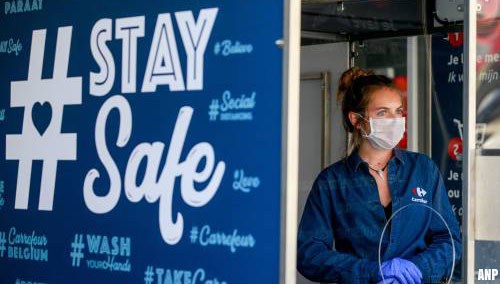202 new people have tested positive for the new coronavirus (Covid-19) in Belgium, confirmed the Federal Public Health Service during a press conference on Wednesday.
This brings the total number of cases in Belgium, since the beginning of the pandemic, to 53,981. The total reflects all people in Belgium who have been infected, and includes confirmed active cases as well as patients who have since recovered, or died from the consequences of the virus.
150 of the newly-infected people live in Flanders, 31 live in Wallonia, and 19 live in Brussels. The FPS does not yet have further information on the place of residence of 2 other people. "The trend of the number of new cases is decreasing again, by about 2% per day over the past 7 days," professor Steven Van Gucht said.
9,706 tests were carried out during the past 24 hours. "This is a little less than the previous days, mainly due to a lower number of tests by the federal testing platform," Van Gucht said.
70 new patients were admitted to hospital in the last 24 hours. “We see a decreasing trend of 8% over the past 7 days,” he added.
205 people have also been discharged from hospital, bringing the total number of people in hospital due to coronavirus at the moment, to 2,014. Of the patients in hospital, 420 are in the intensive care unit. "This trend also continues to decrease, by about 5% per day," Van Gucht said.
82 new people have died from the consequences of the coronavirus, of whom 53 occurred in residential care centres. “Here, too, we see a clear decreasing trend, of 5% per day,” Van Gucht said. The total number of deaths is currently 8,843.
Related News
- Parents fear infection at school more than learning delay
- 'World's best beer' is back on sale in Belgium
- Brussels public transport disrupted for third day in a row
"With the recent relaxations of the measures in mind, it is important to understand where the risks of getting infected are. It mainly depends on two important factors: the duration and the proximity of the contact we have," said Van Gucht.
"The risk of getting infected when crossing someone without speaking to each other is negligible. However, when we speak for a few minutes and we are not wearing a mask, the risk increases a little," he said.
One virus particle is not enough to infect someone, but hundreds or thousands are necessary. "Someone who coughs or sneezes can easily excrete up to a million particles. This is enough to infect a person, or even several people," Van Gucht said.
"A face mask catches a lot of these droplets, but it is still no guarantee as droplets can still escape through the sides," he said, stressing that this shows again why it is so important that sick people stay at home.
"Just by breathing, we also spread a very small number of droplets. To infect each other in this way, we would have to sit close together for more than an hour, like when we are watching a movie together, for example, or when we work at a close distance," Van Gucht said.
"The most important sources of infection are places where people sit together for a long period of time, with bad air circulation. Talking a lot, and loudly, only adds to this," he said. "It is very important that good air ventilation is ensured. Open windows and doors as much as possible," Van Gucht added.
Additionally, it has been demonstrated that small amounts of virus can also spread through faeces. "This is why it is important to put down the toilet seat before flushing. And of course, always wash your hands after," Van Gucht said.
Update: The number of patients confirmed with the new coronavirus (Covid-19) in Belgium is 54,288, as of Thursday 14 May. Read more about it here.
Maïthé Chini
The Brussels Times

